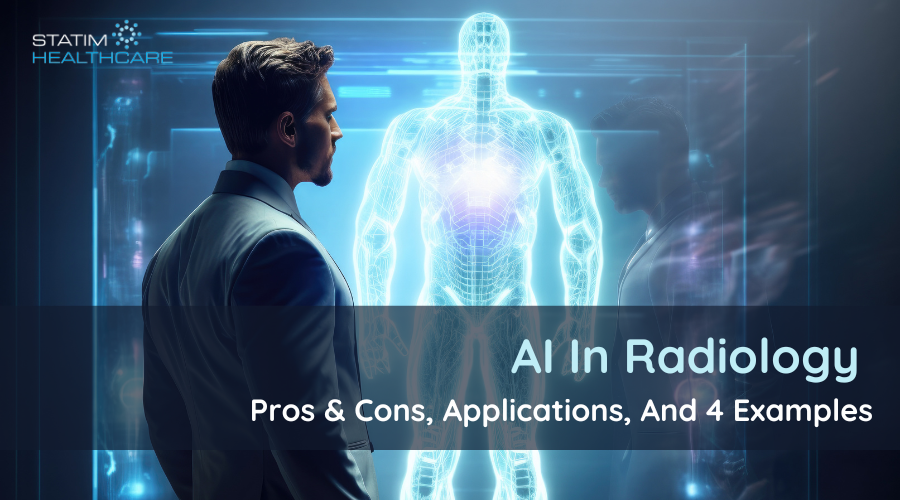Radiology is a well-known diagnostic imaging method that consists of a series of tests. These tests generate images of various parts of the human body for medical purposes. With the evolution of technology and its applications in the medical healthcare sector, researchers and radiology diagnostic services in USA are interested in AI technology for live science. During the early stages, these technologies were focused on chemistry and medicines known as Dendral projects. However, modern AI aims to solve practical medical problems by using advanced techniques like deep learning for the maximum impact of technology in the healthcare sector. Here, we will explore various pros and cons of AI in radiology for practical medical application.
Understanding AI-Based Diagnostic Imaging
AI-based diagnostic imaging is the artificial intelligence technology used in the medical field to enhance the efficiency of accurate patient diagnostics. Medical practitioners and top radiology specialists prefer this approach as it combines the power of AI algorithms and medical imaging techniques for more reliable and timely results.
With AI-based diagnostic imaging, medical professionals can more precisely analyze images such as X-rays, MRIs, and CT scans. The program for AI algorithms is based on a large amount of data from various research and sources that enables them to identify patterns, anomalies, and potential diseases that might go unnoticed by human eyes.
The field of AI-based imaging shows promise and has the potential to revolutionize medical imaging. Through leveraging artificial intelligence top radiology specialists can enhance the accuracy, efficiency, and effectiveness of diagnoses ultimately leading to improved patient care and outcomes.
Pros and Cons of AI-Driven Radiology Diagnostic Imaging
Pros:
- Improved accuracy: AI-driven radiology diagnostic imaging has the potential to enhance the accuracy of diagnoses by analyzing vast amounts of data and identifying subtle patterns that may be missed by human radiologists.
- Faster results: With AI, the process of analyzing medical images can be accelerated, leading to faster diagnoses and treatment plans, which can be critical in emergency situations.
- Increased efficiency: AI systems can help radiologists streamline their workflow by automating routine tasks, allowing them to focus more on complex cases and providing better patient care.
- Reduction in human error: By minimizing human error, AI-driven radiology can help reduce misdiagnoses and improve patient outcomes.
- Access to expertise: AI systems can provide access to specialized knowledge and expertise, even in remote areas where there may be a shortage of skilled radiologists.
Cons:
- Lack of human judgment: AI systems in radiology may lack the experience and intuition of human radiologists, which could result in the potential misinterpretation of images or missed diagnoses.
- Limited data quality: The accuracy of AI-driven radiology heavily relies on the quality and diversity of the data it is trained on. If the training data is biased or incomplete, it may lead to inaccurate results.
- Cost and implementation: Implementing AI-driven radiology systems can be expensive, requiring significant investment in infrastructure, training, and maintenance.
- Ethical concerns: There are ethical considerations regarding the use of AI in radiology, such as patient privacy and the potential for bias in decision-making algorithms.
Application of AI Technology in Radiology Diagnostic Imaging
We have explored what is an AI-based diagnostic imaging system, highlighting various pros and cons and how it can enhance the healthcare sector by providing efficient and effective imaging services for patient diagnostics.
Here, we have highlighted four examples of AI-based Radiology Diagnostic Imaging applications:
Neurological Abnormalities
Using intelligence (AI) in abnormalities involves applying advanced AI technology to analyze complex medical data about brain function. They also assist radiologists in identifying and effectively managing conditions while offering valuable insights for improved treatment approaches. Additionally, AI can be utilized to reduce noise in MRI scans and enhance the capabilities of neural networks.
Classification of Brain Tumors
Utilizing AI technology for the classification of brain tumors has been one of the effective and efficient methods, as traditional classification can take up to 40 minutes, and only after can doctors decide on the course of action for further treatment. Deep learning algorithms and AI-driven systems can efficiently utilize data to categorize and detect intricate pathological conditions like glioblastoma. AI can analyze MRI imaging, assisting in accurate diagnosis and treatment planning for brain cancer.
Radiation Dosage Optimization
The application of AI for radiation dosage optimization aims to enhance image quality and minimize radiation exposure as patients are exposed to harmful radiation during MRI or CT scans. AI-driven radiation dosage optimization enables radiologists to obtain high-quality images with lower radiation doses, improving patient safety and healthcare outcomes.
Detection of Breast Cancer
Breast cancer can only be detected by carefully examining a mammography report, ultrasound, or MRI scan. Manually verifying the report has higher chances of human error and misdiagnosis. According to the recent study published by RSNA (Radiology Society of North America) highlighted that close to 87% of the screen-detected reports had the highest risk and how AI has proven to be the best practice for radiology diagnostic services in USA. With the application of computer-assisted detection (CAD), it suggested that mammogram screenings may miss about 1 in 8 cases of breast cancer, highlighting the need for improved detection methods.
Get the Best Radiology Services from Statim-Healthcare
Statim-Healthcare offers comprehensive radiology reporting services to hospitals and diagnostic centers worldwide. Our team of expert radiologists provides accurate and timely reports, enabling faster diagnoses and better patient outcomes. Contact us to learn more about how we can enhance your radiology services.

